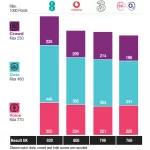UK ISPs Say New Website Blocking Powers Lack “thought or consultation”
The United Kingdom’s Internet Service Providers Association (ISPA) has criticised the Government’s sudden decision to include mandatory blocking of all “adult” websites into the forthcoming Digital Economy Bill 2017, which they say has “the potential to significantly harm the digital economy.”
We covered the new measures in more detail last week (here) and don’t wish to repeat ourselves too much today, but suffice to say that all of the major broadband ISPs already offer an optional network-level filtering system (Parental Controls) and that allows customers to choose whether or not they censor access to websites featuring “adult content.”
Advertisement
But under the new approach the British Board of Film Classification (BBFC) would be given enough power to force all Internet Service Providers (ISP) into restricting access to pornographic sites that fail to put “tough age verification measures” in place to protect children (assuming such a thing is even possible without compromising user privacy and security), thus effectively making many legal websites illegal.
James Blessing, ISPA Chair, Warned MPs:
“The Digital Economy Bill is all about ensuring the UK continues to be a digital world leader, including in relation to internet safety. This is why ISPA supported the Government’s original age verification policy for addressing the problem of underage access of adult sites at source.
Instead of rushing through this significant policy change, we are calling on government to pause and have a substantive discussion on how any legal and regulatory change will impact the UK’s dynamic digital economy and the expectations and rights of UK Internet users.”
As usual the government has focused a lot of its political effort on the word “pornography“, but in the legislation their definition of “adult content” is somewhat more open to interpretation and would perhaps set a dangerous precedent with the threat of mission creep. Never mind the fact that anybody who wants to get around such blocks would have no trouble doing so (e.g. VPN, Proxies, HTTPS, DNS changes etc.).
Until now the ISPA says they have been broadly supportive of the Government’s past efforts to improve online safety and their original age verification policy, but they now say that the latest changes risk going too far. “The inclusion of web blocking powers with little thought or consultation risks undermining plans to boost investment in networks,” said the ISPA today.
The ISPA further notes that the Government has previously said that such a web blocking policy would be “disproportionate” and that the technical measures can be easily circumvented (true) and legal content could be blocked my mistake (it’s happened plenty of times before).
Advertisement
“We are concerned and disappointed it has gone down this path … this change in direction has been agreed without any consultation, with no assessment of costs nor is there any certainty that it will comply with judicial rulings on interference with fundamental rights,” added the ISPA.
What does the ISPA want?
* Clearly assess and quantify the impact of the new policy on the digital economy, particularly regarding competition, innovation and investment.
* Fully assess and be mindful of any unintended consequences, such as the potential to undermine the existing success of the self-regulatory model that has developed over twenty years to tackle child abuse content online.
* Develop an appropriate and robust regulatory system.
The past few weeks have presented somewhat of a double-whammy of bad news for civil liberties groups, ISPs and those who care about their personal privacy. On the one hand the Investigatory Powers Act looks set to snoop on the online activity of every UK Internet user in the country (here), while on the other the Government’s Digital Economy Bill seems intent upon mass censorship. What a year it’s been.
But at the same time there’s also the challenge of actually making these things work and the costs / problems they introduce for the industry, which once again have been largely overlooked.
Mark is a professional technology writer, IT consultant and computer engineer from Dorset (England), he also founded ISPreview in 1999 and enjoys analysing the latest telecoms and broadband developments. Find me on X (Twitter), Mastodon, Facebook, BlueSky, Threads.net and Linkedin.
« UPD Ofcom UK Finds Broadband ISP Plusnet May Have Botched its Bills


















































Comments are closed